 You’ve chosen an uncertain path.
You’ve chosen an uncertain path.
You’ve adopted an inconvenient lifestyle.
You’ve embarked upon an unconventional journey.
You’ve felt the voice inside you growing more urgent.
You’ve committed yourself enough so you can’t turn back.
IN SHORT: You’ve decided to play for keeps.
This is the critical crossroads – the emotional turning point – in the life of every young artist.
I’ve been there myself, and here’s a list of suggestions to help you along the way:(Read part one here and part two here.
1. Execute the truest representation of what you are. As easy as it is to covet the genius of someone you admire, you’ve still got to find your own work. Otherwise you make art that doesn’t feel like your own. And that’s a surefire way to sentence yourself to mediocrity. In the book Art & Fear, David Bayles addresses this issue beautifully:
“Whatever they have is something needed to do their work – it wouldn’t help you in your work even if you had it. Their magic is theirs. You don’t lack it. You don’t need it. It has nothing to do with you.”
The trick is to gradually weed out the parts that aren’t yours. Not to edit yourself – but to stay consistent with yourself. Try asking the question, “If I were me, what would I do?” This casual dissociation gives you an object stance on your art and keeps you accountable to your core.
After all, nobody knows you better than you. And only person who can tell when you’ve accidentally taken a detour off the path of artistic truth is you.
Remember: You don’t need to make art that looks like art – you need to make art that looks like you. Are you killing yourself performing someone else’s magic?
2. Stay loyal to your imperfection. During a recent workshop with a group of writers, one of my audience members posed the following challenge, “My biggest fear is putting something down that will be viewed as wrong or stupid.”
To which I replied, “What’s wrong with being wrong? What’s so bad about being stupid?”
That’s what real artists know: It’s smarter to pump out piles of work and learn from your mistakes instead of theorizing about perfection. Besides: Perfectionism enables procrastination, blocks inventiveness and slaughters playfulness. As long as you do postmortems on everything that fails, you’ll keep growing.
The cool part is: The seed for your next artwork lies embedded in the imperfections of your current piece. And the only way to water that seed is to believe with all your artistic heart that you don’t have to do everything right.
Anything worth doing is worth screwing up initially. But if you’re not willing to be wrong and stupid first, you’ll never invite the opportunity to be right and brilliant second. Is your need for perfection inviting compositional paralysis?
3. Consciously engineer your artistic environment. Otherwise you’ll never cultivate the conditions for creativity to expand. Here’s how: First, direct the traffic flow of your own overcrowded mind. Give yourself quiet time every single day. Second, you need a place where you can be whoever you want to be. A consequence free space for experimentation.
Third, surround yourself with ongoing sources of raw energy. Whether you work best in public or in private, constantly engage all of your senses. Let your artist’s spirit soar. Fourth, cultivate an acute sense of when disinclination is around the corner. Discover what frustrates your ambitions. And don’t be afraid to let resistance win every once in a while. It demonstrates humility for the process and motivates you to return with strength.
Finally, create a policy for managing compositional paralysis. Know when you’ve got it, known when you’ve lost it, know when there’s no way in hell you’re going to get it, and know when you’re going to have to take measures to get it back.
Bottom line: Your style is defined by your habits; your habits are defined by your values. How can you live your life in a way that your art gets done over and over?
4. Art is subordinate to life. Being an artist isn’t just about the art. It’s about the unique life you choose to lead – and the unique identity you choose to own – that informs and inspires the art. As such, art is the residue of a life fully lived. As I learned in the aforementioned Art & Fear:
“When you are lazy, your art is lazy; when you hold back, it holds back; and when you hesitate, it stands there staring, with hands in its pockets. But when you commit, it comes on like blazes.”
Forget about self-expression and focus on creating a self to express. Your art is not some discharge left when you subtract all the things you haven’t done – it’s the full payoff for the adventurous life you’ve lived.
If you want to let the canvas become the extension of your artist’s spirit, try this: Search the world for meaning constantly and aggressively, give yourself room to respond authentically, and then draw a line from your life to your art. Every single day. You’ll never be blocked again. And the work you produce will move the world.
As John Coltrane said, “Your music can’t blast out of your instrument unless it’s been born in your life first.” Are you creating art, or living a creative life and taking notes?
5. Boldness is required to move forward. People who need certainty in their lives are less likely to ship, shatter the status quo and use their art to disturb the world into something better. And understandably, avoiding the unknown has considerable survival value.
Just look at nature: Animals that leave the flock and go their own way get eaten.
But the reality is, fear is a barrier that shields you from the kinds of naked experience that fuels the art that matters most. Uncertainty is the real asset. The true companion of successful art making.
Your challenge is to go at your work in a way that freaks you out. To take the plunge with your clothes still on and trust that you’ll figure out how to swim before the water fills your lungs.
Don’t give your fears the dignity of silence. Burn safe art. Walk to the edge of the precipice. Switch off your rational mind and give yourself license to explore without a map. Are you fighting feelings of uncertainty or surfing on the waves of discomfort?
6. Anonymity is bankruptcy. Artists who play for keeps are the ones who spend just as much time marketing their work as they do making it. Otherwise all their hard labor adds up to nothing but a mere wink in the dark.
But that doesn’t mean you need a marketing plan – it means you need a visibility plan.
It means you need is to find something that you can create scarcity around that people will pay for. And not because you’re trying to trick people into buying something – but because you’re trying to make something worth buying and spreading. As my friend Mark Sanborn says, “Every product must be sold.”
And don’t feed me the Van Gough defense, either. I know he only sold one painting in his life. He also lived in abject poverty, experienced severe depression and committed suicide at the age of thirty-seven.
You’re not Van Gough. Get selling or get another career. People have to make time to visit the world you created. And when they get there, they’re buying your person, your philosophy, your process and then your product. Are you selling all four?
REMEMBER: When you’re ready to play for keeps, your work will never be the same.
Make the decision today.
Show the world that your art isn’t just another expensive hobby.
LET ME ASK YA THIS…
Have you committed with both feet yet?
LET ME SUGGEST THIS…
For the list called, “35 Ways to Leverage Your Next Media Appearance,” send an email to me, and you win the list for free!
* * * *
Scott Ginsberg
That Guy with the Nametag
Author, Speaker, Entrepreneur, Mentor
[email protected]
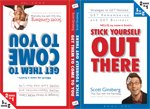 The world’s FIRST two-in-one, flip-flop book!
The world’s FIRST two-in-one, flip-flop book!
Buy Scott’s comprehensive marketing guidebook on Amazon.com and learn how to GET noticed, GET remembered and GET business!

 You don’t need permission to dream.
You don’t need permission to dream.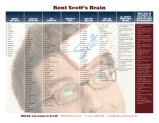 “I usually refuse to pay for mentoring. But after Scott’s first brain rental session, the fact that I had paid something to be working with him left my mind – as far as I was concerned, the value of that (and subsequent) exchange of wisdom and knowledge, far outweighed any payment.”
“I usually refuse to pay for mentoring. But after Scott’s first brain rental session, the fact that I had paid something to be working with him left my mind – as far as I was concerned, the value of that (and subsequent) exchange of wisdom and knowledge, far outweighed any payment.” You’ve chosen an uncertain path.
You’ve chosen an uncertain path.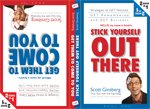 The world’s FIRST two-in-one, flip-flop book!
The world’s FIRST two-in-one, flip-flop book!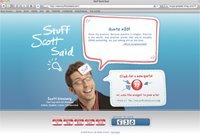 Who’s quoting YOU?
Who’s quoting YOU?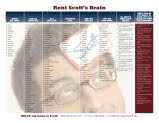 “I usually refuse to pay for mentoring. But after Scott’s first brain rental session, the fact that I had paid something to be working with him left my mind – as far as I was concerned, the value of that (and subsequent) exchange of wisdom and knowledge, far outweighed any payment.”
“I usually refuse to pay for mentoring. But after Scott’s first brain rental session, the fact that I had paid something to be working with him left my mind – as far as I was concerned, the value of that (and subsequent) exchange of wisdom and knowledge, far outweighed any payment.” “When you zero out your board, anything is possible.”
“When you zero out your board, anything is possible.”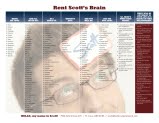 “I usually refuse to pay for mentoring. But after Scott’s first brain rental session, the fact that I had paid something to be working with him left my mind – as far as I was concerned, the value of that (and subsequent) exchange of wisdom and knowledge, far outweighed any payment.”
“I usually refuse to pay for mentoring. But after Scott’s first brain rental session, the fact that I had paid something to be working with him left my mind – as far as I was concerned, the value of that (and subsequent) exchange of wisdom and knowledge, far outweighed any payment.”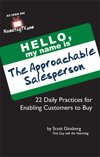
 Here’s the biggest challenge my
Here’s the biggest challenge my 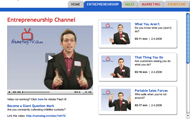
 You’ve chosen an uncertain path.
You’ve chosen an uncertain path.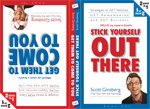 The world’s FIRST two-in-one, flip-flop book!
The world’s FIRST two-in-one, flip-flop book! Scalability is overrated.
Scalability is overrated.